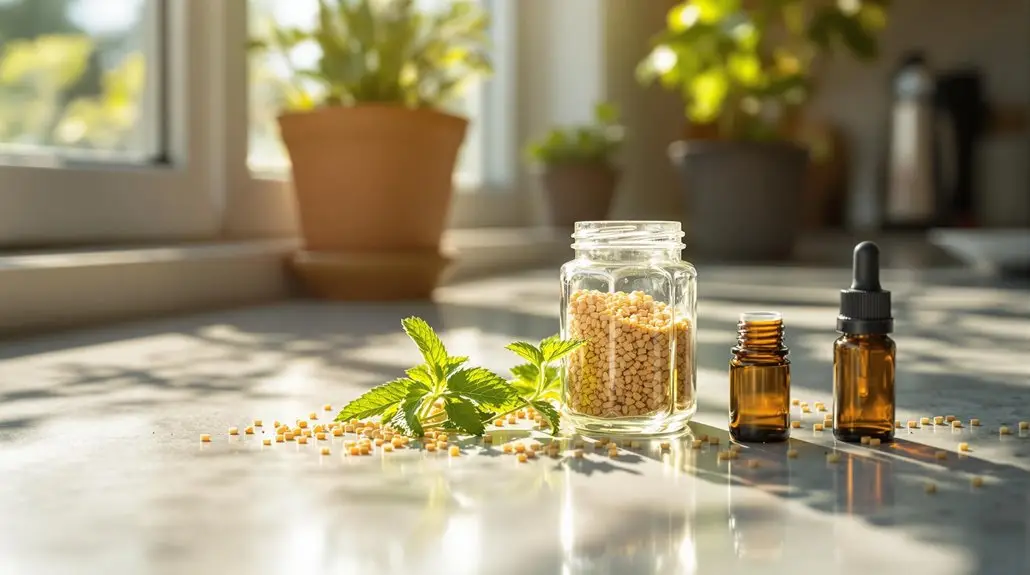The best natural ant treatments for your home include a mix of effective strategies using vinegar, essential oils, and preventative measures. A vinegar and water solution works great as a repellent, disrupting their pheromone trails. Essential oils like peppermint and tea tree effectively deter ants and can kill them on contact. Don’t forget to seal entry points and maintain good cleanliness to keep them away. Regularly monitoring for ant activity can also help catch problems early. Want to discover more options and tips to guarantee a pest-free environment? You’re in the right place for expert advice!
Key Insights
- A vinegar and water solution effectively repels ants and disrupts their pheromone trails when sprayed at entry points.
- Essential oils like peppermint, tea tree, and cinnamon create barriers and can kill ants on contact.
- Powder-based natural ant killers provide long-lasting protection and are easy to apply using lawn spreaders.
- Immediate action techniques such as soap sprays and boiling water can eliminate ants quickly and efficiently.
- Regular sanitation practices and sealing entry points help prevent future ant infestations in homes.
Understanding Ant Behavior
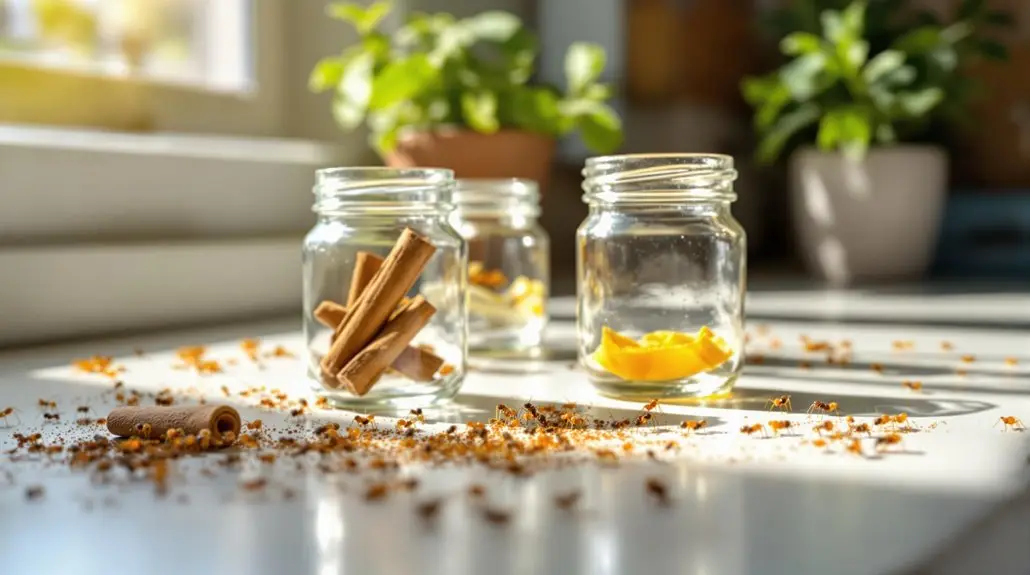
Understanding ant behavior is vital for effectively managing and preventing infestations in your home. Ants are drawn to your space for several reasons. They’re particularly attracted to food sources, so if you’ve got crumbs, spills, or uncovered sugary and greasy items, you may find them visiting more often.
They also seek out moisture, meaning leaky pipes or damp areas can quickly become their favorite hideouts. In fact, many species like Carpenter Ants thrive in moist, decaying wood, which can lead to structural damage if left untreated. It’s important to note that targeted eco-friendly solutions can help address such issues effectively.
When it comes to entry points, ants are sneaky; they can slip through tiny cracks and gaps in walls, foundations, and even around windows and doors. This means that even the smallest oversight in sealing your home can lead to an ant invasion.
Ants communicate using pheromone trails, which help them coordinate activities like foraging for food and alerting others to danger. This sophisticated social structure allows them to work efficiently as a unit, maintaining and updating trails to guarantee they always know where to find food.
Nesting habits vary, with ants often establishing nests in warm, hidden areas such as behind baseboards or inside walls. They can create intricate tunnels and chambers, making it imperative for you to understand where they might be setting up shop.
Benefits of Natural Treatments
Natural ant treatments offer numerous advantages that make them an appealing choice for managing infestations in your home. When you opt for these eco-friendly solutions, you’re not just protecting your space; you’re also creating a more secure environment for your family and pets.
Here’s why natural treatments stand out:
- Environmental Safety: Using non-toxic ingredients like diatomaceous earth and essential oils means you won’t leave harmful chemical residues behind. You can feel good knowing you’re minimizing your impact on the planet.
- Cost-Effectiveness: Many natural remedies use affordable household items. You can often whip up your own ant repellent at home, saving money while reducing the need for professional pest control services. Additionally, the use of natural extermination methods like boiling water can effectively target ant colonies without significant expense.
- Health Benefits: With natural treatments, you avoid exposure to harsh chemicals that can harm your health. Plus, they’re less likely to trigger allergies and can improve indoor air quality, creating a more comfortable living space.
Common Household Ant Types
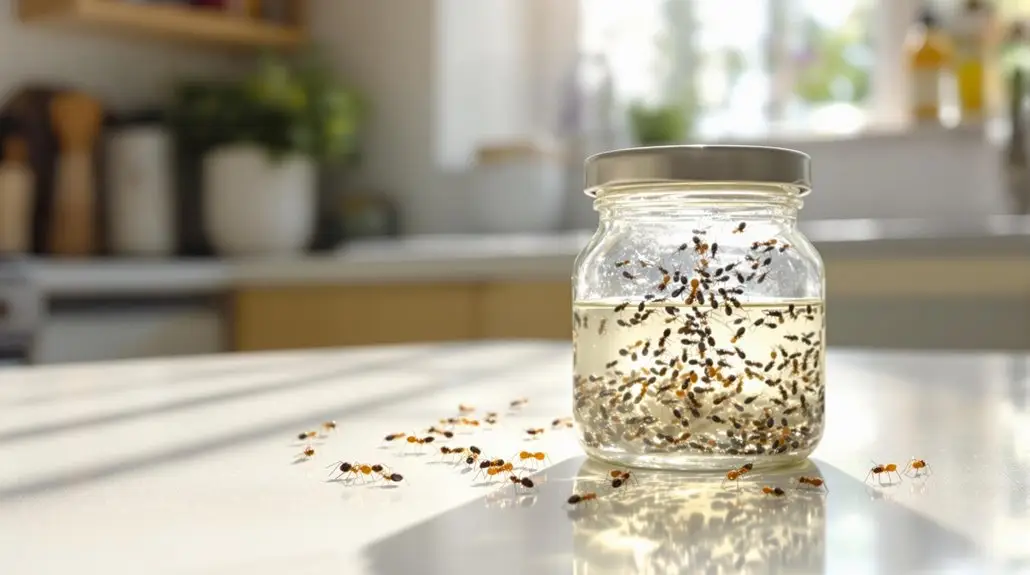
When dealing with ant infestations, it’s important to recognize the different types of ants that might invade your home. Understanding these common household ant types can help you take the right steps to manage them effectively.
First up are Odorous House Ants, which are dark brown to black and measure about 1/16 to 1/8 inch long. They love sweets and have a distinct rotten coconut smell when crushed. Common characteristics of these ants include their attraction to food and water sources, making kitchens and bathrooms prime locations for infestations. These ants are often found in multiple species of Florida.
You’ll often find them nesting under mulch, stones, or in your walls and floors.
Next, there are Argentine Ants, uniformly brown and slightly larger, ranging from 1/16 to 1/4 inch. They prefer wet environments and create distinct trails along sidewalks and trees. Like Odorous House Ants, they can contaminate food and excrete a musty odor.
Pharaoh Ants are another common invader. These tiny yellowish ants with dark-tipped abdomens are about 1/16 inch long. They nest in dark spaces indoors and can transmit diseases, making them a serious concern, especially in hospitals.
Lastly, you have Pavement Ants, which are dark brown to black and roughly 1/8 inch long. They thrive in cracks in pavement and feed on grease and insects. While they can contaminate food, they don’t pose serious health risks.
Vinegar and Water Solution
A vinegar and water solution is a simple yet effective way to tackle ant problems in your home. By mixing equal parts of white vinegar and water in a spray bottle, you create a powerful repellent. You can also experiment with apple cider vinegar for a different scent. This solution disrupts the pheromone trails ants rely on, confusing them and encouraging them to leave your space. Additionally, using eco-friendly products can enhance your pest control efforts without compromising safety.
Here’s how to get started:
- Spray Entry Points: Target windows, doors, and baseboards where ants are likely to enter.
- Focus on Activity Areas: Apply the solution to kitchen counters, cabinets, and food sources to deter them effectively.
- Reapply Regularly: Since the scent fades, you’ll need to reapply it several times a week for lasting results.
Make sure to shake the mixture well before each use. The strong smell of vinegar not only repels ants but is also harmless for kids and pets. Additionally, ants are social insects living in structured colonies, which means that addressing the issue promptly can help prevent larger infestations.
If you find the solution isn’t quite doing the trick, consider increasing the vinegar concentration or adding a few drops of essential oils for an extra repelling effect.
Essential Oils for Ant Control

When it comes to ant control, essential oils can be your best allies. You can create effective blends using oils like peppermint, clove, and cinnamon to repel these bothersome insects. Essential oils have historical use in pest control, providing a natural alternative to chemical pesticides. In fact, NaturePest specializes in organic pest control methods that minimize the use of harmful chemicals. Let’s explore how to mix these oils and the best ways to apply them for maximum impact.
Effective Essential Oil Blends
Harnessing the power of essential oils can be an effective way to control ant invasions in your home or garden. By using specific blends, you can create a natural deterrent that not only repels but can also eliminate these annoying invaders.
Here are some essential oils you might want to contemplate:
- Peppermint Oil: Interferes with ant scent trails while providing a pleasant aroma for you.
- Cinnamon Oil: Kills ants on contact and creates a lethal barrier around areas of activity.
- Tea Tree Oil: Disrupts ant communication, preventing them from accessing bait areas.
Combining these oils can enhance their effectiveness. For instance, mixing peppermint and cinnamon oils creates a potent blend that repels and kills ants simultaneously. Moreover, the use of essential oils serves as an eco-friendly solution for pest control.
You might also think about adding clove oil, which acts quickly and has a warm scent. Citrus oils like lemon and lemongrass are great for distracting ants and can suffocate them when used correctly.
Embracing these natural solutions not only helps you reclaim your space but also fosters a sense of belonging in a home free from unwanted pests.
Application Methods and Tips
Effective application methods are key to utilizing essential oils for ant control. Start by creating your own spray solution; mix 10-20 drops of your chosen essential oil—like peppermint or lemon—with 2 cups of water. Fill a spray bottle with this mixture and target areas around baseboards, windows, and doorways. These spots are vital entry points for ants, and a good spray can deter them effectively. Ants are often attracted to food sources and moisture, so ensuring these areas are clean and free of spills will enhance your efforts.
Don’t forget your cabinets and pantries! Spray these areas regularly to keep ants at bay. If you spot ant trails, disrupt their path by spraying directly on them.
For a more concentrated approach, soak cotton balls in undiluted essential oil and place them where you’ve seen ants.
Reapply your mixtures regularly to maintain effectiveness, especially after cleaning. Just remember to keep essential oils out of reach of pets and children, as they can be toxic.
Always use these oils in well-ventilated spaces to avoid overwhelming scents. By following these tips, you’ll create a welcoming home environment, free from those bothersome ants. You’ve got this!
Powder-Based Ant Killers
Powder-based ant killers offer a practical solution for managing ant infestations, especially since many are non-toxic and secure for use around pets and children. If you’re looking for an effective way to tackle these bothersome invaders, powder-based options can be a great choice. They not only target ants but can also help reduce other pests like ticks.
Here are a few benefits of using powder-based ant killers:
- Safe for your family: Many powders are made from natural ingredients, making them a secure choice around kids and pets.
- Easy application: You can use a lawn spreader for wide areas, which simplifies the process.
- Long-lasting protection: Some powders provide extended effectiveness, guaranteeing you won’t have to reapply constantly. Additionally, many powder-based solutions show a significant decrease in ant populations within days, making them a highly effective option.
When using powder-based ant killers, you’ll want to keep a few tips in mind. For the best results, apply the powder around the perimeter of your home and directly on ant trails or mounds.
It’s essential to avoid windy or rainy conditions to make sure the powder stays in place. While some reapplication may be necessary, the ease of use and safety features make these products appealing for anyone looking to foster a pest-free home.
Incorporating powder-based ant killers into your pest management routine can help create a welcoming environment while effectively managing ant populations. With just a little effort, you can reclaim your space and enjoy your home without the worry of ants.
Effective Liquid Sprays
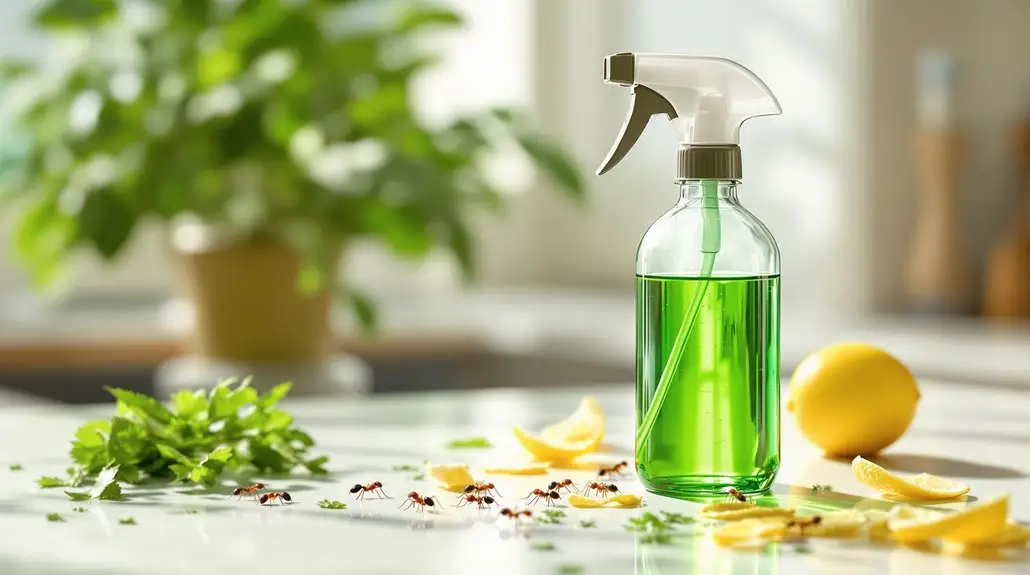
If you’re looking for natural solutions, vinegar-based sprays and essential oil blends can be surprisingly effective against ants. These options not only deter ants but also leave your home smelling fresh. Additionally, using homemade solutions like vinegar disrupts ant trails, making it harder for them to navigate. Let’s explore how you can use these liquid sprays to tackle your ant problem.
Vinegar-Based Solutions
Vinegar-based solutions offer a simple and powerful way to keep ants at bay. The strong smell of vinegar disrupts ants’ pheromone trails, making it hard for them to communicate and navigate. While vinegar won’t kill ants, it effectively repels them, ensuring a secure method around kids and pets. Here’s how you can create and use your vinegar solutions:
- Mix equal parts water and white vinegar in a spray bottle for a basic solution.
- Apply it around entry points like windows and doors to deter ants.
- Reapply regularly, as the scent fades over time. Vinegar solutions can deter ants from entering homes.
Spray the solution on kitchen counters and floors, where ants often invade.
For intense infestations, consider using pure white vinegar or apple cider vinegar mixed with water. Remember to adjust the concentration based on the severity of the problem and the ant species.
Essential Oil Sprays
Essential oil sprays can be a potent weapon in your ant-repelling arsenal. These natural solutions not only smell great but also effectively deter ants from invading your space. Peppermint oil, for instance, masks their scent trails with its strong minty aroma, while clove oil can even act as a toxin, killing ants on contact.
Citrus oils like grapefruit and lemon contain D-Limonene, which disrupts their chemical trails, making it harder for them to navigate.
To create your own effective spray, combine 30-40 drops of your chosen essential oils with water in a glass spray bottle. Adding a tablespoon of witch hazel or alcohol helps disperse the oils, while a touch of Castile soap can enhance its insecticidal properties.
Spray around entry points like door frames and windows, and directly on any visible ant trails.
Be sure to repeat applications as necessary and store your mixture properly, away from heat and light. Just remember to label your bottle clearly and keep it out of reach of kids and pets.
With these sprays, you’ll reclaim your home and feel a sense of belonging in your pest-free sanctuary!
Immediate Action Techniques
When ants invade your space, quick action is essential to regain control. You don’t want to wait around for them to take over your kitchen or living room.
Luckily, there are several immediate action techniques you can use to tackle the problem head-on. Here are some effective methods to kill ants on contact:
- Vinegar and Water Solution: Mix equal parts vinegar and water, then wipe down areas where ants are seen. This not only kills them but also removes their pheromone trails, making it less likely for more to follow. The lingering vinegar scent helps repel future invaders too.
- Soap or Cleaner Spray: Combine dish soap with water, or use a glass cleaner. Spraying this mixture directly on ants or their entry points will kill them instantly. Plus, it cleans surfaces as you work, so it’s a win-win!
- Boiling Water: If you can find the colony, boiling water is a powerful option. Pour it directly on the ants to kill them instantly and drown any remaining ones. Just be careful to avoid burns!
Using any of these methods can help you regain control of your space quickly.
Preventative Measures
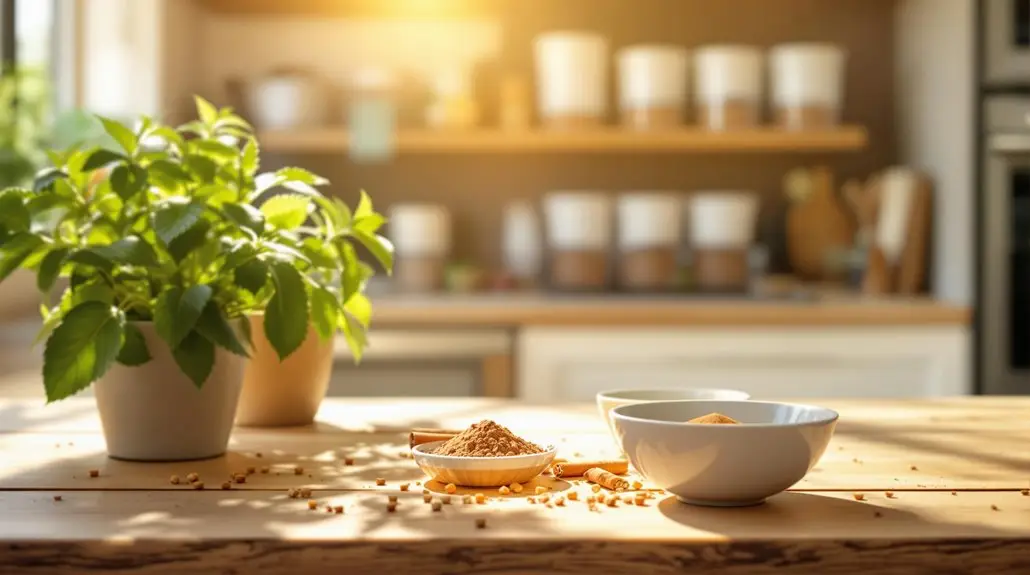
Preventing ants from invading your home is often more effective than dealing with them once they’re inside. Start by managing your outdoor space. Trim back shrubs, foliage, and tree branches that could provide a bridge for ants. Rake mulch and clear a 6-inch zone around your house’s base to eliminate hiding spots. Remove organic debris like grass clippings and fallen fruit, as these can attract ants.
Next, focus on sealing entry points. Inspect windows, doors, and any gaps around pipes, and use caulk or weatherstripping to close them off. Repair any loose siding or trim, and guarantee all vents are screened to block potential intrusions.
Maintaining your yard is important too. Keep it tidy by removing clutter and debris that might serve as ant homes. Opt for drier mulch and regularly check for ant mounds to treat them before they spread. You might even want to create physical barriers using diatomaceous earth around your yard’s perimeter.
Lastly, pay attention to your home structure. Inspect the foundation and walls for signs of ant activity, fixing any moisture issues that could attract pests. Good ventilation in damp areas like basements is vital. Incorporating landscape insect pest control into your routine can further help in managing pest populations.
You can also use natural repellents such as cinnamon or citrus peels around your home’s perimeter. By taking these preventative measures, you’ll create an environment that’s less welcoming to ants, making your home a more comfortable place for you and your loved ones.
Cleaning Up Food Sources
Keeping your home ant-free starts with eliminating food sources that attract them. Ants are relentless when it comes to finding food, so your best defense is to keep your living space clean and tidy. Here are some essential tips to help you maintain a food-free environment:
- Wipe down surfaces: Regularly clean kitchen counters, sinks, and stoves to remove crumbs and spills. A mixture of equal parts vinegar and water can help eliminate pheromone trails that ants leave behind.
- Store food securely: Use sealed containers for all food items, including pet food. This prevents ants from detecting food smells that lead them into your home.
- Manage waste properly: Empty trash cans frequently and confirm they’ve tight-fitting lids. Also, keep recyclables clean and avoid leaving organic waste near your home.
Focus particularly on high-risk areas like the kitchen and pantry. Pay attention to the floors, as food particles can accumulate there too.
By staying proactive with your cleaning routine, you’ll create an environment that ants find uninviting.
Incorporating these habits into your daily life not only helps keep ants at bay but fosters a sense of belonging in a clean, welcoming home.
Sealing Ant Entry Points
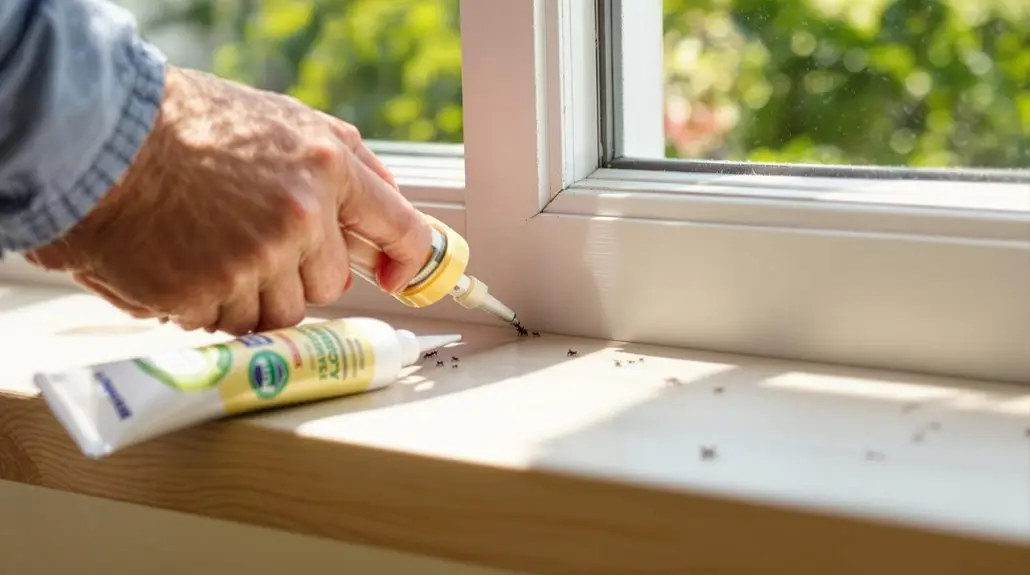
To effectively seal ant entry points, you’ll need to conduct a thorough inspection of your home for any cracks or gaps that could serve as pathways for these unwanted pests.
Start by checking around windows and doors—these are common places for ants to sneak in. Next, inspect your foundation and basement for any holes or gaps that might’ve developed over time.
Don’t forget to look around pipes, electrical outlets, and utility lines, as these can also be entryways.
Once you’ve identified these openings, it’s time to take action. Use caulk to fill any gaps around windows, doors, and baseboards. For larger holes in walls or floors, expanding foam works wonders.
Installing door sweeps will help seal the gap between the door and the floor, preventing ants from getting inside.
Outdoors, fill cracks in the foundation and exterior walls with concrete patching compound. Seal gaps around pipes and faucets using caulk or steel wool.
Applying a weatherproof sealant around outdoor electrical outlets can further protect your home.
Don’t overlook your vents and chimneys; repair or replace damaged screens to keep ants out.
Regular Maintenance Practices
Maintaining a clean and organized home is essential for keeping ants at bay. Regular maintenance practices not only help you create a welcoming environment but also guarantee that bothersome ants won’t feel at home in your space.
By following a few simple habits, you can make your home less inviting to ants and more enjoyable for you and your family.
Here are some key practices to incorporate into your routine:
- Clean and sanitize: Promptly clean up dishes, crumbs, and spills. Keep food in airtight containers and dry any standing water in your kitchen and bathrooms.
- Remove pheromone trails: Use warm water and dish soap to clean areas where ants are seen. Mixing white vinegar with water can disrupt their pheromone trails and repel them.
- Manage food and water sources: Store trash in sealed bins and fix any leaky plumbing. Regularly clean countertops and floors to eliminate sweet or sticky residues.
Monitoring for Ant Activity
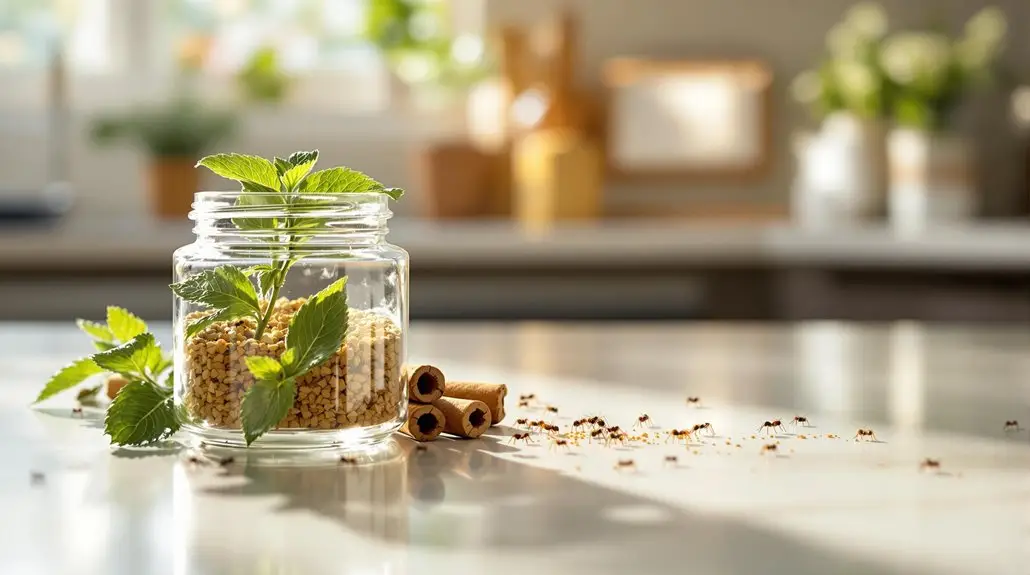
Monitoring for ant activity is essential in preventing infestations before they escalate. By keeping a close eye on potential entry points and observing ant behavior, you can effectively manage any ant issues that arise.
Here are some key areas and tools to help you monitor ant activity:
| Monitoring Strategy | Description |
|---|---|
| Identify Entry Points | Check cracks around windows, doors, and pipes. |
| Observe Ant Trails | Follow the trails to determine their path and activity. |
| Common Infestation Areas | Focus on kitchens, pantries, and bathrooms. |
| Tools for Monitoring | Use sticky traps and a magnifying glass for inspection. |
| Log Activity | Keep a log of sightings to modify your approach. |
When you identify entry points, inspect for cracks and crevices, especially around appliances. Look for ants near food sources in your kitchen and pantry, as well as in moist areas where they tend to gather. Observing the trails will help you understand their movements and peak activity times, making it easier to plan your treatments.
Utilizing tools like sticky traps can also help capture ants and provide insight into which types you’re dealing with. By diligently monitoring these factors, you’ll build a clearer picture of the ant activity in your home, allowing you to respond effectively and create a more comfortable living environment for you and your family.
Combining Methods for Success
To effectively tackle an ant problem, combining different methods is key.
Layering repellents like essential oils with targeted spot treatments can create a strong defense.
Plus, consistent maintenance practices help guarantee your efforts keep those ants at bay.
Layering Repellents Effectively
Layering repellents effectively can greatly enhance your success in keeping ants at bay. By combining different natural repellents, you create a more formidable barrier that ants struggle to cross. Here’s how to layer your approach:
– Essential Oils: Use peppermint and tea tree oils mixed with water in a spray bottle. Spray around entry points and ant trails.
For added strength, consider lemon eucalyptus or cinnamon leaf oil on cotton balls.
– Household Items: Incorporate a vinegar solution or lemon juice to mask pheromone trails.
Sprinkle coffee grounds or a baking soda and sugar mix near ant paths for additional deterrence.
– Natural Substances: Utilize diatomaceous earth or cayenne pepper around baseboards and entryways.
These options not only repel ants but also create a hostile environment for them.
Targeted Spot Treatments
Combining various methods for targeted spot treatments can considerably boost your ability to eliminate ants from your home.
Start with essential oils like peppermint and tea tree, which not only smell great but also deter ants effectively. Mix 10-20 drops of peppermint oil with water in a spray bottle and spritz around baseboards and windows. For a stronger impact, saturate cotton balls with tea tree oil and place them in areas where you see ants.
Don’t overlook household items like white vinegar and lemon juice. A 50/50 vinegar solution sprayed directly on ants can kill them instantly while removing pheromone trails. Similarly, lemon juice can be used to create an all-purpose spray that helps keep ants at bay.
For an extra layer of defense, consider using natural powders like food-grade diatomaceous earth. Sprinkle it in areas where ants frequent; it works wonders by cutting through their exoskeletons.
Consistent Maintenance Practices
While it may seem intimidating, maintaining a consistent approach to ant control can considerably reduce their presence in your home. By combining various methods, you create an environment that’s less inviting for these bothersome intruders.
Start with regular cleaning and sanitizing—this helps eliminate the pheromone trails that ants leave behind.
To make your efforts more effective, consider these key practices:
- Natural Deterrents: Use peppermint or cinnamon essential oils around entry points to repel ants.
- Persistent Barriers: Apply food-grade diatomaceous earth in strategic locations to disrupt ant movement.
- Long-Term Prevention: Seal cracks and plant mint around your home to create a natural barrier.
Incorporating these strategies into your routine fosters a sense of community and belonging, as you share tips and successes with friends and family.
Remember, consistency is vital. By dedicating a little time each week to these practices, you not only protect your home but also contribute to a cleaner, more harmonious living space.
Embrace these methods, and enjoy the peace of mind that comes with a well-maintained home!
Frequently Asked Questions
Can Children and Pets Safely Be Around Natural Ant Treatments?
When it comes to natural ant treatments, you’ll want to prioritize security for both your children and pets.
Always dilute essential oils and keep them out of reach, as some can be harmful if ingested.
Diatomaceous earth is generally secure, but avoid inhalation and keep it away from food.
Vinegar and baking soda are usually secure too, just verify you monitor for any accidental ingestion.
Always stay vigilant to keep your home secure and healthy!
How Long Does It Take for Natural Treatments to Work?
Natural treatments can work pretty quickly, but it depends on the method you choose.
For instance, white vinegar and boiling water kill ants on contact, giving immediate results. Essential oils can repel them within minutes.
However, methods like diatomaceous earth or boric acid take a bit longer, usually up to a few weeks, as they work gradually.
Regular monitoring and reapplication are key to ensuring your efforts keep those ants away effectively.
Are There Specific Plants That Repel Ants Naturally?
Imagine your garden as a battleground, where certain plants act as your loyal warriors against ants.
You’ve got mint, with its strong scent that ants can’t stand, and marigolds, which disrupt their senses.
Rosemary and lavender also join the fight, releasing oils that repel these troublesome invaders.
By planting these natural allies, you can create a welcoming space for yourself while keeping unwanted guests at bay.
It’s nature’s way of having your back!
What Are the Best Times to Apply Ant Repellents?
When you’re dealing with ants, timing’s key for applying repellents. Early mornings and evenings are ideal since ants are most active then.
After you’ve cleaned surfaces, it’s a great moment to apply your repellents, too. Focus on areas near food and behind appliances where ants like to hide.
Don’t forget to check outdoor spots after rain or during dry spells to keep those troublesome ants at bay effectively!
Can Natural Ant Treatments Damage Surfaces or Furniture?
Natural treatments can be a refreshing change, but they also come with risks.
While vinegar and dish soap are gentle and eco-friendly, they might damage certain surfaces if used too often.
On the flip side, essential oils can be effective but could stain your furniture if not diluted properly.
It’s all about balance—always test a small area first to guarantee your home stays secure and welcoming for everyone.
Say Goodbye to Ants Naturally: Contact NaturePest Holistic Pest Control Today!
To sum up, tackling ant infestations naturally can be effective and secure. For instance, a family in your neighborhood used a vinegar and water solution to deter a persistent line of ants in their kitchen. They combined this with sealing entry points, and within a week, they noticed a dramatic decrease in activity. By understanding ant behavior and employing regular maintenance, you can keep your home ant-free without resorting to harsh chemicals.
If you’re looking for more effective and eco-friendly solutions to manage pests in your home, consider reaching out to NaturePest Holistic Pest Control. Our experts can help you develop a comprehensive plan to keep your home safe and pest-free using natural methods. Don’t wait—take control of your home today!

